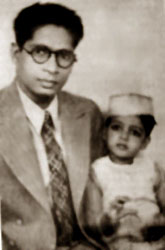 Harivanshrai Bachchan was born on 27th of November, 1908 at the small town of Patti in Uttar Pradesh. His original name was Harivanshrai Srivastava. He was called Bachchan at his home that means `child`. He took his early education from a municipal school and then joined Kayasth Paathshaalas as per their family tradition to learn Hindi language. Later he received degree from the Allahabad University and Banaras Hindu University. In these days he came into contact with Mahatma Gandhi and was heavily influenced by Indian Freedom struggle.
Harivanshrai Bachchan was born on 27th of November, 1908 at the small town of Patti in Uttar Pradesh. His original name was Harivanshrai Srivastava. He was called Bachchan at his home that means `child`. He took his early education from a municipal school and then joined Kayasth Paathshaalas as per their family tradition to learn Hindi language. Later he received degree from the Allahabad University and Banaras Hindu University. In these days he came into contact with Mahatma Gandhi and was heavily influenced by Indian Freedom struggle.
Harivanshrai Bachchan participated in around 500 largely attended Kavi-Sammelans in different cities of India. He was a lecturer in Kayastha College, Allahabad. In 1942 he joined as an English professor of Allahabad University. In 1952 he moved to UK. There he received Ph.D in English literature from St Catharine`s College, Cambridge. He was the second Indian to receive doctorate in English literature from prestigious Cambridge University. From then he started to use `Bachchan` as his last name instead of his surname Srivastava. After returning to India he began to teach again but few days later he joined as a producer for All India Radio, Allahabad. In 1955, he went to Delhi and joined the Ministry of External Affairs of the Government of India as an officer on special duty and also started working for the evolution of Hindi as the official language of India.
Harivanshrai Bachchan started literary career in 1932 when he wrote his first book `Tera Haar`. But he became famous for his early lyric poem `Madhushala`, which was published in the year 1935. It has been translated into many regional languages and English. It was followed by Madhubala in 1936 and Madhukalash in 1937. His other major works are Nisha Nimantran (1938), Ekaant Sangeet (1939), Aakul Antar (1943), Satarangini (1945), Halaahal (1946), Bengal ka Kaavya (1946), Khaadi ke Phool (1948), Milan Yamini (1950), Pranay Patrika (1955), Dhaar ke idhar udhar (1957), Aarti aur Angaare,(1958), Buddha aur Naachghar (1958), Tribhangima (1961), Chaar kheme Chaunsath khoonte (1962), Do Chattane (1965), Bahut din beete (1967), Kat-ti pratimaaon ki awaaz (1968), Ubharte Pratimaano Ke Roop (1969), Jaal Sameta (1973). In November, 1984, he wrote his last poem Ek November 1984 on Indira Gandhi`s assassination.
He also translated Shakespeare`s Macbeth and Othello and Omar Khayyam`s Rubaiyat in Hindi. He wrote his autobiography in four volumes namely Kya Bhooloon Kya Yaad Karoon, Need ka Nirmaan Fir, Basere Se Door and Dashdwaar Se Sopaan Tak. In the Afternoon of Time is the English version of his autobiography, for which he was awarded with the Saraswati Samman. In 1969 he received Sahitya Akademi award. In 1976, he was given the Padma Bhushan Award. In 1994, he was awarded the Yash Bharati Samman by the Government of Uttar Pradesh. He was also conferred with the Soviet Land Nehru Award and the Lotus Award of the Afro-Asian writers` conference. In 2003 Indian postal department released a stamp as a tribute to him.
Harivanshrai Bachchan rose to fame at the time when Bengal Famine had broke out and wrote his famous long poem Bengal ka Kal. After the assassination of Mahatma Gandhi he wrote in collaboration with Sumitranandan Pant two volumes of poems in memoriam Khadi Ke Phool and Soot Ki Mala. He is considered as the most helpful, obliging, kind and humane of Hindi writers. One of his very famous books `Madhushala` has been translated in English as `House of Wine`. Some of his other poems are translated in several world languages, including English and Russian, Sindhi and Marathi language. He was the bridge between Romanticism and Revolutionary poetry in the thirties. He was the father of famous Bollywood superstar Amitabh Bachchan. He described himself as Mitti Ka Tan, Masti Ka Man, Kshan-Bhar Jivan - Mera Parichay. Harivanshrai Bachchan died on January 18th, 2003, at the age of 95 years.



















